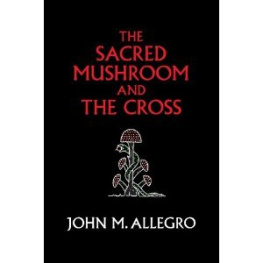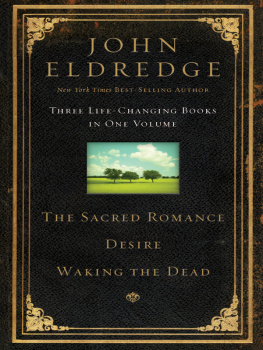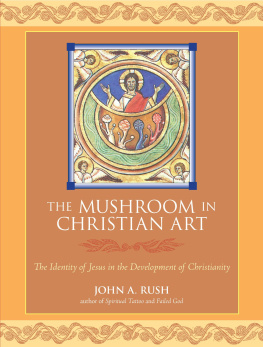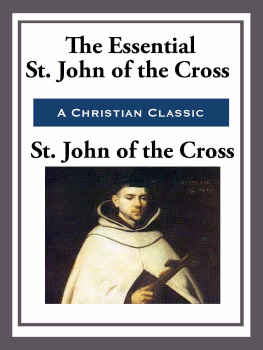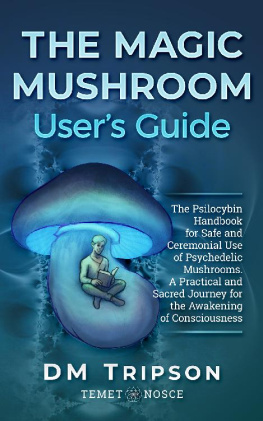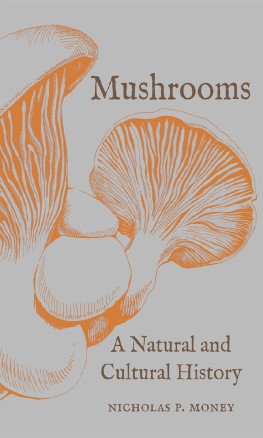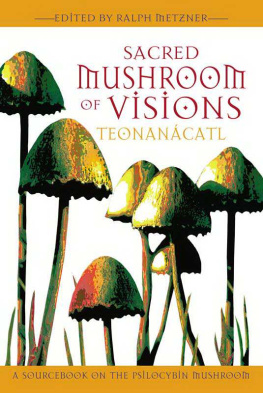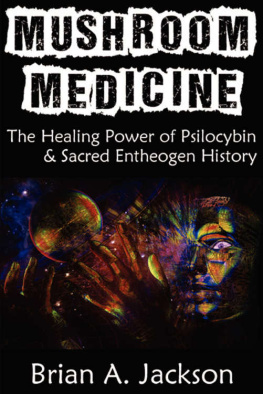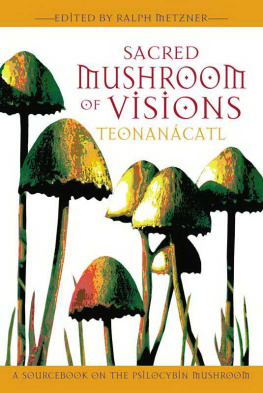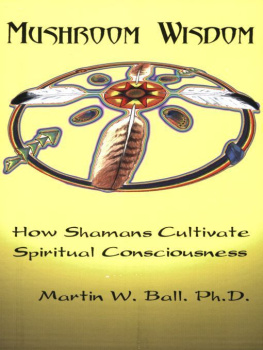John Allegro - The Sacred Mushroom And The Cross
Here you can read online John Allegro - The Sacred Mushroom And The Cross full text of the book (entire story) in english for free. Download pdf and epub, get meaning, cover and reviews about this ebook. year: 2010, genre: Religion. Description of the work, (preface) as well as reviews are available. Best literature library LitArk.com created for fans of good reading and offers a wide selection of genres:
Romance novel
Science fiction
Adventure
Detective
Science
History
Home and family
Prose
Art
Politics
Computer
Non-fiction
Religion
Business
Children
Humor
Choose a favorite category and find really read worthwhile books. Enjoy immersion in the world of imagination, feel the emotions of the characters or learn something new for yourself, make an fascinating discovery.
- Book:The Sacred Mushroom And The Cross
- Author:
- Genre:
- Year:2010
- Rating:5 / 5
- Favourites:Add to favourites
- Your mark:
- 100
- 1
- 2
- 3
- 4
- 5
The Sacred Mushroom And The Cross: summary, description and annotation
We offer to read an annotation, description, summary or preface (depends on what the author of the book "The Sacred Mushroom And The Cross" wrote himself). If you haven't found the necessary information about the book — write in the comments, we will try to find it.
John Allegro: author's other books
Who wrote The Sacred Mushroom And The Cross? Find out the surname, the name of the author of the book and a list of all author's works by series.
The Sacred Mushroom And The Cross — read online for free the complete book (whole text) full work
Below is the text of the book, divided by pages. System saving the place of the last page read, allows you to conveniently read the book "The Sacred Mushroom And The Cross" online for free, without having to search again every time where you left off. Put a bookmark, and you can go to the page where you finished reading at any time.
Font size:
Interval:
Bookmark:

THE SACRED
MUSHROOM
AND THE
CROSS
A study of the nature and origins
of Christianity within the fertility cults of the ancient Near East by John M. Allegro
DOUBLEDAY & COMPANY, INC.
GARDEN CITY, NEW YORK
Piracy notice:
In order to keep this information available to the public, thisbook has been pirated!
A message to those whove taken this book out of print. This book will forever circulate. You will never be able to remove it from the public light, as you, the Vatican and Anheuser Busch attempted to do.
In such a case as 2000 years of intellectual hijacking, this book will now remain forever free online.
Though Allegros theories seemed extreme at the time, philology today knows he was right. See a publication by Piotr Michalowski in Cambridge Encyclopedia of the World's Ancient Languages, edited by Roger D. Woodard.
To the reader, enjoy a once banned book.
To the suppressors, Fuck you!
ORIGINAL CHARACTERS OF SUMERIAN CUNEIFORM AND
OTHER HIEROGLIPHIC CHARACTERS WERE LOST BY THE
CHARACTER RECOGNITION SOFTWARE USED IN THE PIRACY
OF THIS BOOK. PLEASE SEEK AN ORIGINAL COPY OF THE
SACRED MUSHROOM AND THE CROSS TO REFERENCE
MISSING LETTERS AND OTHER POSIBLE ERRORS MADE BY
THE RECOGNITION SOFTWARE.
150 pages of reference notes at the back of the book have beenomitted. Footnote numbers have (for the most part) been left
intact. Some Zeros (0) and ones (1) were not recognized.
Primary errors made by Allegro are HIGHLIGHTED IN RED
Allegro did NOT understand the growth cycle, effects and "bitterness" of the Amanita muscaria. Allegro overlooked some references to both A. pantherina and P. cubensis, and wrongfully classified Rue as an "abortifacient", not recognizing Acacia and Rue as an Ayahuasca analogue. Allegro also wrongfully assumed that the mushrooms, and not religion and government themselves, were the cause of the shaman to protest against their suppression by the churches and governments. With that said, Allegro was a pioneer in the field of ethnomycology, and founded many of the ideas many researchers use today (though most deny it).
Enjoy your read!
Authors Note
This book is the first published statement of the fruits of some years work of a largely philological nature. It presents a new appreciation of the relationship of the languages of the ancient world and the implication of this advance for our understanding of the Bible and of the origins of Christianity. It will be appreciated that such a statement has to be furnished with the technical data, even though much of it must be outside the scope of the general reader, for whom the book is primarily intended. In order to leave the text as unencumbered as possible, these notes have been gathered in a body at the end of the book, and the numbered references within the text may be safely ignored by the non-specialist.
Acknowledgements
Quotations from the Revised Standard Version of the Bible, copyrighted 1952 and 1956, are used by permission.
Quotations from the Homeric Hymns, Plinys Natural History, and Josephus Jewish Wars and Antiquities are used by permission of the Loeb Classical Library.
The frontispiece photograph is used by permission of Rex Lowden.
The photograph facing page 74 is used by permission of Photographe Thuillier.
Contents
Introduction page xi
I In the Beginning God Created... i
II Sumer and the Beginnings of History 8
III The Names of the Gods 19
IV Plants and Drugs 29
V Plant Names and the Mysteries of the Fungus 36
VI The Key of the Kingdom 44
VII The Man-child Born of a Virgin 54
VIII Womans part in the Creative Process 63
IX The Sacred Prostitute 76
X Religious Lamentation 83
XI The Mushroom Egg and Birds of Mythology 91
XII The Heavenly Twins 97
XIII Star of the Morning 109
XIV Colour and Consistency 118
XV Mushroom Cosmography 133
XVI David, Egypt, and the Census 141
XVII Death and Resurrection 151
XVIII The Garden of Adonis, Eden and Delight;
Zealots and Mus1im 177
XIX The Bible as a Book of Morals 191
Notes 207
Indices 308
Illustrations
Colour Plates
Amanita muscaria frontispiece
A Christian fresco showing the Amanita muscaria as Facing page the tree of good and evil in the Garden of Eden 74
Figures page
1 The Near East
2 Sumer and Accad 10
3 Section through the calyx and fruit of Henbane 58
4 Diagrammatic section of (i) a volva before birth 92
(ii) a mature mushroom 92
5 Zion, and the valleys of Kidron and Hinnom 136
6 Jerusalem to the Dead Sea 138
Introduction
No one religion in the ancient Near East can be studied in isolation. All stem from mans first questioning about the origin of life and how to ensure his own survival. He has always been acutely conscious of his insufficiency. However much he progressed technically, making clothes, shelter, conserving food and water supplies, and so on, the forces of nature were always greater than he. The winds would blow away his shelter, the sun parch his crops, wild beasts prey on his animals: he was always on the defensive in a losing battle. Out of this sense of dependency and frustration, religion was born.
Somehow man had to establish communications with the source of the worlds fertility, and thereafter maintain a right relationship with it. Over the course of time he built up a body of experiential knowledge of rituals that he or his representatives could perform, or words to recite, which were reckoned to have the greatest influence on this fertility deity. At first they were largely imitative. If rain in the desert lands was the source of life, then the moisture from heaven must be only a more abundant kind of spermatozoa. If the male organ ejaculated this precious fluid and made life in the woman, then above the skies the source of natures semen must be a mighty penis, as the earth which bore its offspring was the womb. It followed therefore that to induce the heavenly phallus to complete its orgasm, man must stimulate it by sexual means, by singing, dancing, orgiastic displays and, above all, by the performance of the copulatory act itself: However &r man progressed in his control of the world about him there remained a large gap between what he wanted at any one time and what he could achieve on his own account. There was always some unscalable mountain, some branch of knowledge which remained unpenetrable, some disease with no known cure. It seemed to him that if he had managed painstakingly to grope his way to a knowledge and dexterity so far above the animals, then in some mysterious way his
thinkers and artisans must have been tapping a source of wisdom no less real than the rain that fructified the ground. The heavenly penis, then, was not only the source of life-giving semen, it was the origin of knowledge. The seed of God was the Word of God. The dream of man is to become God. Then he would be omnipotent; no longer fearful of the snows in winter or the sun in summer, or the drought that killed his cattle and made his childrens bellies swell grotesquely. The penis in the skies would rise and spurt its vital juice when man commanded, and the earth below would open its vulva and gestate its young as man required. Above all, man would learn the secrets of the universe not piecemeal, painfully by trial and fatal error, but by a sudden, wonderful illumination from within.
Next pageFont size:
Interval:
Bookmark:
Similar books «The Sacred Mushroom And The Cross»
Look at similar books to The Sacred Mushroom And The Cross. We have selected literature similar in name and meaning in the hope of providing readers with more options to find new, interesting, not yet read works.
Discussion, reviews of the book The Sacred Mushroom And The Cross and just readers' own opinions. Leave your comments, write what you think about the work, its meaning or the main characters. Specify what exactly you liked and what you didn't like, and why you think so.

